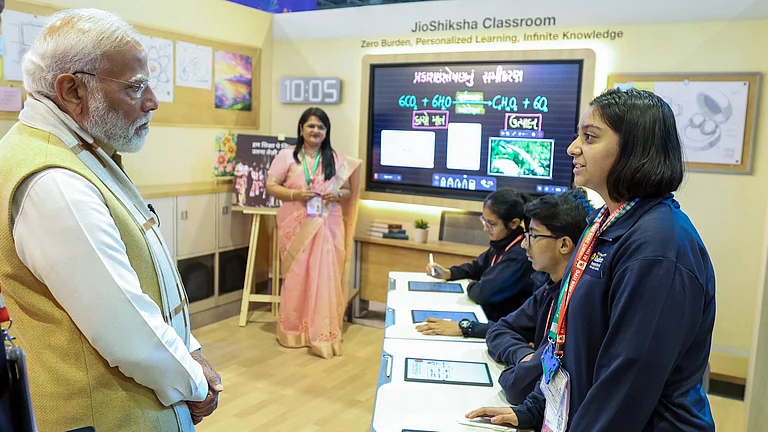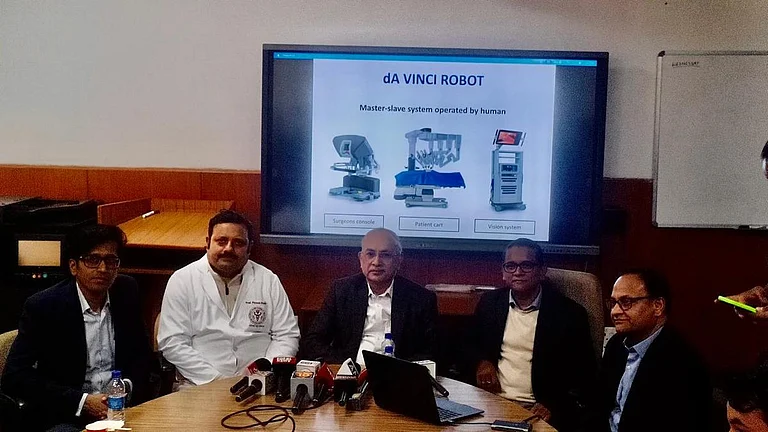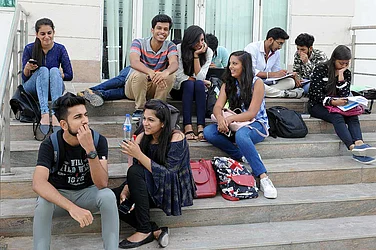
Prof VK Tripathi is a plasma physicist and professor emeritus at the Indian Institute of Technology (IIT) Delhi, where he taught until his retirement in 2013.
He has been relentlessly advocating for communal harmony and against sectarian violence for more than four decades.
Dubbed the "pamphlet man," he has distributed thousands of pamphlets over decades, initiating dialogues on streets, dhabas, and campuses.
As the world witnessed the news of the ceasefire in Gaza last month—brokered after two years of devastation that claimed more than 60,000 lives—a 77-year-old retired physics professor, VK Tripathi, was reluctant to celebrate. “They had put their foot on the neck of the Palestinians of Gaza and were beating them up. They have stopped beating them, but have not removed the foot from the neck. Gaza still can’t breathe. They deserve the same freedom, the same dignity as any Israeli, Indian, or American,” he says.

Fasting for Gaza
Professor VK Tripathi has long been advocating for the Palestinian cause. On August 15, 2025, as India marked its 79th Independence Day with parades, speeches, and fireworks celebrating freedom from colonial rule, retired physics professor Vipin Kumar Tripathi sat in silent protest, fasting in solidarity with the people of Gaza. Accompanying him was his daughter, Rakhi Tripathi, an associate professor at FORE School of Management, New Delhi, who has become a key supporter in amplifying his message through digital platforms. Tripathi, clad simply and clutching stacks of pamphlets, distributed flyers highlighting the mass starvation and suffering in Gaza, urging passersby to recognise the shared humanity in global struggles for justice. But the peaceful demonstration was short-lived. Around 6 p.m., police officers arrived, shouting and demanding the removal of posters. "Why are you fasting for Gaza? Did you not see what is happening in India to our Hindus?" One inspector reportedly challenged Tripathi, according to accounts shared by his daughter on social media. Tripathi, undeterred, responded calmly: "You are a human being first, inspector later."
This pattern persisted into his latest campaign in September, when Tripathi was cornered by a group of locals in Mumbai's Dharavi area while distributing similar pamphlets on Gaza’s solidarity. According to videos surfacing on X and Instagram, the locals were seen challenging Tripathi to "look at your own" country's issues. Later, he was detained by 22 police officers who seized his materials for lacking permission, before releasing him without charges. These incidents, captured in videos that went viral on platforms like Instagram and X, underscored the tensions surrounding discussions of Palestine in India, even as Tripathi invoked Gandhi's principles of non-violence and universal empathy.
These moments at Rajghat and Dharavi were not isolated events, but a culmination of Tripathi's lifelong commitment to combating communalism and advocating for the oppressed. In an exclusive interview conducted shortly after the incidents, Tripathi reflected on his journey from academia to activism, weaving in stories of personal conviction and grassroots resistance. "My fast on Gaza was aimed to make people feel the pain of the people suffering there. Not superficially, feel it deeply, how people have been going through a genocide, starved," he said. "I wanted to and wanted others to feel that, because I think we have become insensitive, and forget to feel pain. If we feel pain, we won't show off, we won't pride, we won't hate, we will show the truth."

A Life shaped by Secular Roots
Born in Uttar Pradesh’s Jhansi in 1948, just a year after India's independence, Tripathi is a plasma physicist and professor emeritus at the Indian Institute of Technology (IIT) Delhi, where he taught until his retirement in 2013. His academic career was distinguished, but it is his post-retirement activism that has defined him as a tireless crusader against sectarianism. Influenced by his father, a freedom fighter who spent time with Gandhi, and a liberal Muslim school teacher named Ahmed Baksh, Tripathi developed a secular outlook early on. "I was born after independence in 1948, and my father was involved in the freedom movement for 13 years," he recounted. "He had spent some time with Gandhi. He was deeply impressed and influenced by him. Since my childhood, he has told me about Gandhi, his values, the freedom struggle, and so on. My school teacher was Ahmed Baksh. He was a practicing Muslim, but very liberal. He influenced me very deeply. So, my upbringing helped me develop a secular liberal outlook."
Tripathi's concern for the Palestinian cause dates back to 1982. "My concern about Gaza has been since 1982, when Israel invaded Lebanon and about 20,000 Palestinians were killed," he explained. "Since then I have been worried about the Palestinian-Israeli question." This global awareness intersected with domestic crises, propelling him into action. While on sabbatical at the University of Maryland in 1989, he learned of the Bhagalpur riots in Bihar, where communal violence claimed hundreds of lives, predominantly Muslims. "At that time, I was in the United States of America, working at the University of Maryland on my sabbatical from IIT Delhi.”
Returning to India briefly to assess the situation, Tripathi organised a meeting of 36 non-resident Indians (NRIs) on January 6, 1990, at the University of Maryland. "We talked about what to do, how to bring back normalcy in Hindu-Muslim relations in India. That was a major concern for me," he said. This gathering marked the inception of his activism. "I decided that day that I would spend the rest of my years in IIT and my life in developing grassroots resistance against communalism." Upon returning to India permanently, he founded the Sadbhav Mission in July 1990—an organisation dedicated to fostering harmony and countering religious intolerance.

Education as Resistance
The mission's early efforts focused on education as a tool for bridging divides. From 1990 to 1992, Tripathi and volunteers taught mathematics in Delhi's slums, such as Ber Sarai and Hauz Rani, using these sessions to build rapport with families and challenge prejudices. "We primarily taught poor children in Ber Sarai near IIT and at Hauz Rani on Sundays. We would gather about 30-40 children and teach them mathematics for two hours. That was also a means to develop a rapport with the families,” he recollects. “So, after teaching the children, we would go to their families and talk to parents to shun prejudice. After the demolition of the Babri Mosque in 1992, I found that we had to close down these activities because there was widespread tension in the country."
The demolition of the Babri Masjid in 1992 forced a pivot. "During the widespread tensions, we had to work in curfew-bound areas. But later on, when things settled down, we decided to teach not in slums, but in organised schools. We found a school in Delhi in Ambedkar Nagar,” recalls Tripathi. “It was a Girls' school where the results of high school children were very poor. Out of 200, I think only 8 girls passed, and the result was 3 percent. So, we contacted the teacher, the principal, and she was very kind to allow us to teach mathematics to their children over the weekend." According to Tripathi, for three to four years, IIT teachers volunteered, not just imparting math skills but fostering conceptual clarity and freedom from bias.
The 2002 Gujarat riots, which killed over 1,000 people, mostly Muslims, deepened Tripathi's resolve. He worked in relief camps and villages like Pandravada, where 27 were killed and 157 homes burned. Noticing the low enrollment of Muslim students in high schools due to entrance tests favoring privileged children, Tripathi initiated after-school classes: “Muslims in the village were largely from labour class families, working class families. So, the children had no support from their parents in their homework. Their performance was not that good. They could not qualify for the entrance test.” His collaboration with local figures in the city further increased admissions.
In Godhra, still under curfew nine months post-violence, Tripathi organised a mathematics workshop for 1,000 students—half Hindu, half Muslim—followed by harmony sessions. “That year, the majority of the school children had failed in mathematics. So, we organised a mathematics workshop,” he says. “After two days of the workshop, we held a two-hour session on harmony. Children listened to us, and we were able to send a message of peace and harmony across the whole city without any propaganda, without any advertisement. So, I think we recognised the worth of education as a means of reaching the hearts of the students as well as their parents."
By 2006, Tripathi extended his efforts to madrasa teachers, holding annual workshops in Delhi to equip them with math teaching skills and encourage outreach to Hindu children. "The thing is that madrasa teachers are usually very sincere, very innocent. They have no animosity toward anyone. So, they are real non-violent activists. But their activities were limited to Muslim children. I wanted to make them conversant with mathematics... I wanted them to not only localise themselves or limit themselves to madrasas, but also go and teach multiple subjects to both Muslim and Hindu children whenever they get an opportunity."

The Pamphlet Man
Tripathi's signature tool? Pamphlets. Dubbed the "pamphlet man," he has distributed thousands over decades, initiating dialogues on streets, dhabas, and campuses. "Opening a dialogue with people requires you to have something in your hand," he explained. In 1990, opposing L.K. Advani's Rath Yatra, he led a parallel yatra from Rajghat to Rashtrapati Bhavan with 65 people, distributing flyers. After Babri's demolition, a three-month campaign saw 40,000 pamphlets handed out, drawing volunteers like girls from Miranda House who braved curfew-bound areas.

The Circle That Sustains Him
Tripathi's family provides crucial support. Rakhi, who joined him at Rajghat, balances encouragement with health concerns. "My father is physically very strong. Even today, he walks several kilometers and works tirelessly. When he observed a fast in the heat, weakness did come, but his body quickly recovered," she said. “At the same time, his health is carefully looked after at home, especially by my mother. Our home environment itself is shaped around social concerns rather than routine family gossip."
Rakhi, who has taken her father’s grassroots activism to digital platforms, vividly recalls a moment that crystallised her commitment to his cause. "One night, around 2 a.m., I found Papa hunched over his desk, meticulously preparing pamphlets," she shared. "When I urged him to rest, he looked up and said, ‘No, this needs to be done now.’ That moment struck me deeply; his unwavering dedication and passion were undeniable. I knew then that I had to support him fully. I decided to amplify his on-ground work through social media, starting modestly on Facebook and gradually expanding to Twitter and Instagram, to share his message of harmony and justice with a broader audience."
Colleagues and students echo admiration. Professor Narendra, a former IIT colleague, said: "His hard work inspired me to be a part of his campaign. Watching him, I realised that true change does not come from grand gestures but from consistent, humble, and sincere efforts." Former student Kumar Kirti recalled Tripathi's role during the 2019 CAA protests: "At that time, he was already following his calling—campaigning for education among marginalised communities and fostering coexistence... It made me respect him even more."
Students like Suzain Khan, who met him at a protest, say: "His actions reminded me that civic responsibility doesn’t retire with age, and that empathy and informed dialogue are powerful tools, even in the face of overwhelming violence. These pamphlets may not end the bombings or blockade on their own, but they plant seeds of awareness and solidarity." Maria from Jamia Millia Islamia added: "Even at this age, he distributes pamphlets and initiates dialogues about social issues, seeing advocacy as a moral duty rather than an abstract cause. The young generation has a lot to learn from him."
The Politics of Feeling
Tripathi's motivation? A Gandhian ethos of feeling others' pain. "Gandhi said, studying means you can differentiate between right and wrong. You need to study imperialism and socialism; you need to implement and feel them." While the ceasefire is in place, Tripathi warns against complacency, pointing to India's shifting Palestine policy post-liberalisation. He urges, "Gaza’s people should be as free and as independent as us.” He continues, “Even if I presume that there is a complete cessation of bombings, the people are still not free to speak. There is a lingering terror of the army over there. They are suffocated. They have no government, no representatives, no land. If people have even a little bit of humanity, they need to wake up.”
In an era of polarisation, Tripathi's work—rooted in dialogue, education, and empathy—reminds us that true independence is collective. As he noted, "The elite of the world are one, masses of the world are also one...People of the world are the same, their agony is the same, their pain is the same." His continuing efforts, from Sadbhav Mission to the Rajghat fast, though interrupted, echo Gandhi's legacy, calling for a world where humanity transcends borders.
























